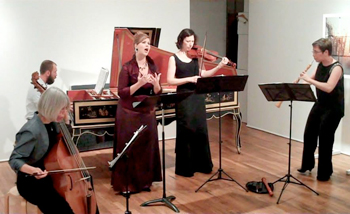by Nicholas Jones

The program, “A Woman Scorned,” featured lurid stories of betrayal and revenge involving five of the great women characters of classical myth. These were stories that the court of Louis XIV loved, apparently seeing them as safe ways in which to rehash their own tortuous infidelities: Juno, the goddess jealous of her philandering husband Jove; Phaedra, driven mad by passion for her stepson; Armida, sorceress and seductress; Circe, who turned men to beasts; and Medea, sorceress and lover—passed over by Jason for a younger woman, she proceeds to poison her rival and then murder her own children in order to drive her ex to kill himself.
Not material for the faint-hearted. Oddly, though, the aria we heard from Marc-Antoine Charpentier’s 1693 opera about Medea is stunningly beautiful, the lament of a woman who has gone over the edge and recognizes why she needed to go there and what she has lost in doing so. As CWRU musicology professor Susan McClary explained in her pre-concert talk, these are angry women, but also complex women: in their music we hear regret and even love, as well as rage.
Les Délices, the brainchild of Cleveland baroque oboist Debra Nagy, has a strong regular ensemble – violinist Julie Andrijeski, gambist Emily Walhout, and harpsichordist Michael Sponseller. They play with elegance, verve, and joy, even when the material is grim. The rather gothic subject matter gave plenty of opportunity for them to produce some stunning musical effects —sea monsters rising from the waves, for example, and witches summoning up the powers of Hell. Rough stuff for the pleasant environs of Plymouth Church!
Les Délices has consistently introduced remarkable guest artists to Cleveland audiences. This concert brought Chicago-based mezzo-soprano Angela Young Smucker to ignite the fires of these passionate arias. Smucker gave these dark texts an appropriately rich, dark, and purple timbre, performing her miniature roles with dramatic intensity and commanding presence. She has a powerful and supple voice, managing both the big effects that baroque opera demands and the elegant ornamentation that the style equally calls for. I think I have never been so moved by the power of the port de voix (what the Italians called appoggiatura), that cadence figure so dear to the French, in which a dissonant note hangs ominously one step above the long-delayed cadence note.
The program was exciting in part because of its freshness. A cantata on Circe by Colin de Blament; another on Phaedra by Thomas Louis Bourgeois—these pieces are rarely, if ever heard. Nagy is daring to feature such unknown works, but the dare pays off: the musicians perform as if they know that every phrase is a new adventure for the audience. The sense of musical excitement complements the dramatic excitement of these ferocious scenarios.
Michael Sponseller’s harpsichord solo by Jean Henry d’Anglebert, based on Lully’s then-famous passacaille for the sorceress Armide, gave the other players a break and demonstrated even more fully that these passionate texts retain their excitement and appeal even without the voice.
Another instrumental work, Jean-Féry Rebel’s sonata “La Junon” (Juno) opened the program; again, though it lacked the singer, it represented the goddess’s passions with no less intensity than if it had been sung.
Dynamic string playing by Andrijeski kept the fires going: her violin alternately shot sparks and dropped tears. Walhout’s expressive gamba playing delved into the depths of these passions.
This short, intense program reminds us that, before the Romantics, musicians knew how to bring forth big feelings out of small forces.
Now in its fifth year, Les Délices has proven its effectiveness as a musically sophisticated and programmatically savvy ensemble. The next concerts are February 1 and 2, featuring the stellar Boston violinist Scott Metcalfe: see www.lesdelices.org.
Photo from the Saturday performance at the William Busta Gallery.
Nicholas Jones is Professor of English at Oberlin College and a keen amateur musician.
Published on ClevelandClassical.com October 8, 2013
Click here for a printable version of this article.



